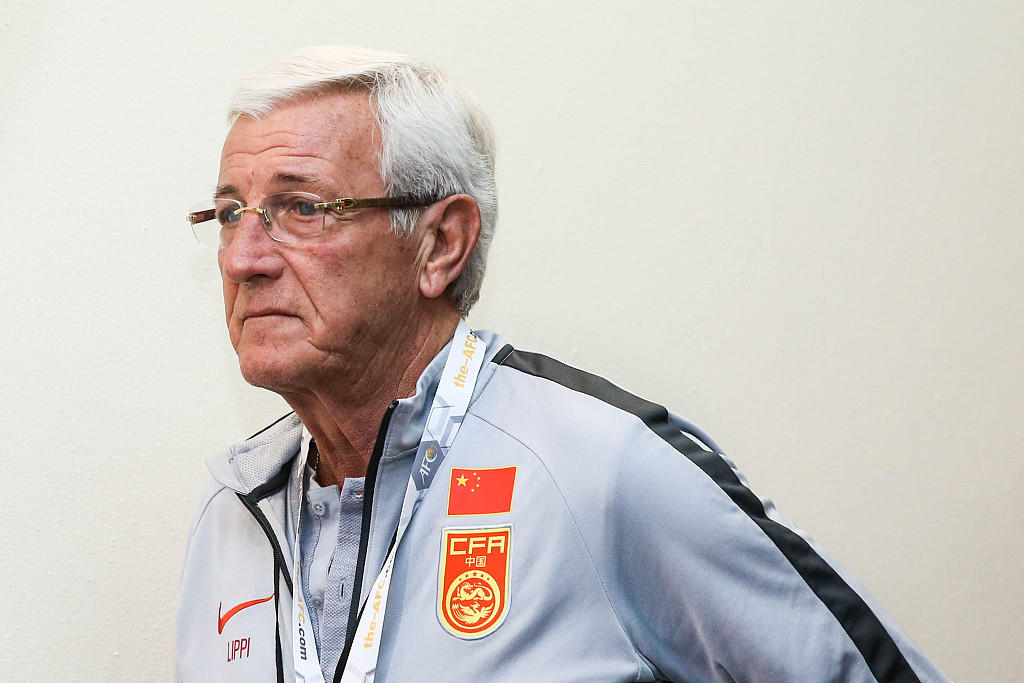For Marcello Lippi, the writing is on the wall.
Standing on the touchline with his eyebrows deeply furrowed, the former World Cup and Champions League-winning coach was unable to conceal the slow-boiling frustration over his players' appalling sluggishness. The pained expression on his face became an all too familiar sight the whole night.
China had blown the gilt-edged chance to dethrone the table-topping Syrians after a demoralizing 2-1 loss in the 2022 World Cup qualifier, and dissatisfied Chinese media have wasted no time sharpening their pens after witnessing another catastrophic performance. Change is needed, and Lippi knew his fate was sealed.
"I don't want to talk about this game... I was well paid and I take the full responsibility. I am now announcing my resignation," declared the 71-year-old Italian during his brief post-match presser before storming out of the room. The interpreter, who had barely began to translate Lippi's words, was left astonished by the dramatic scene.

Marcello Lippi storms out of the press conference room after declaring he is quitting as China coach in Dubai, November 14, 2019. /VCG Photo
Marcello Lippi storms out of the press conference room after declaring he is quitting as China coach in Dubai, November 14, 2019. /VCG Photo
This is the second time this year that Lippi has abandoned the ship. The legendary tactician attempted to stand down in January having declined to sign a new contract following China's calamitous exit at the Asian Cup. But he changed his mind and made a heroic return to the fold in March after two naturalized stars, Brazil-born striker Ai Kesen and England-born midfielder Li Ke, were added to the squad.
Yet, it didn't end well. Ai struggled to replicate his club form, and Li lost his mojo having largely rooted to the bench. Several stalwarts in this Chinese team also looked a shadow of their former selves. The ever-reliable Hao Junmin was unable to dictate the tempo throughout the games, and Zhang Linpin, whose own goal on Thursday condemned China to defeat, played like a rabbit caught in the headlights.
It's safe to say almost all key cogs in Lippi's rebuilt football machine failed to have the desired effect. The veteran tried different tactical tweaks to get the best out of his players, chopped and changed personnel, but invariably got the same outcome. Privately, if not publicly, Lippi must have harbored serious doubts about the wisdom of retaking the China job and come to the conclusion: the squad that he was working with was nowhere near good enough to compete in Asia.

China's Wu Lei, Hao Junmin and Wu Xi (L-R) appear frustrated after their World Cup qualifying defeat to Syria in Dubai, November 14, 2019. /VCG Photo
China's Wu Lei, Hao Junmin and Wu Xi (L-R) appear frustrated after their World Cup qualifying defeat to Syria in Dubai, November 14, 2019. /VCG Photo
Lippi certainly did not help himself on occasions, particularly with his refusal to check in on potential fresh bloods by watching more Chinese Super League games, but the truth is that the seeds for the woeful qualifying campaign that has unfolded were sown during a disastrous Asian Cup that laid bare some of the wishful thinking that goes on behind the scenes when it comes to coach recruitment.
It inevitably reflects poorly on Chinese football that Lippi, who led Italy to an incredible World Cup triumph, won five Series A titles and a UEFA Champions League with Juventus, has encountered such difficulties and embarrassment in his two doomed stints as the China boss.
After the dust settled, the spotlight should be shining on those at the very top of the Chinese Football Association, not just Lippi. Under current circumstances, more worrying than the poor results for China are the insipid displays that offer no hope to local fans, who were once again left with two burning questions: Why did they not see this coming? Who is the next big name to clear the mess?